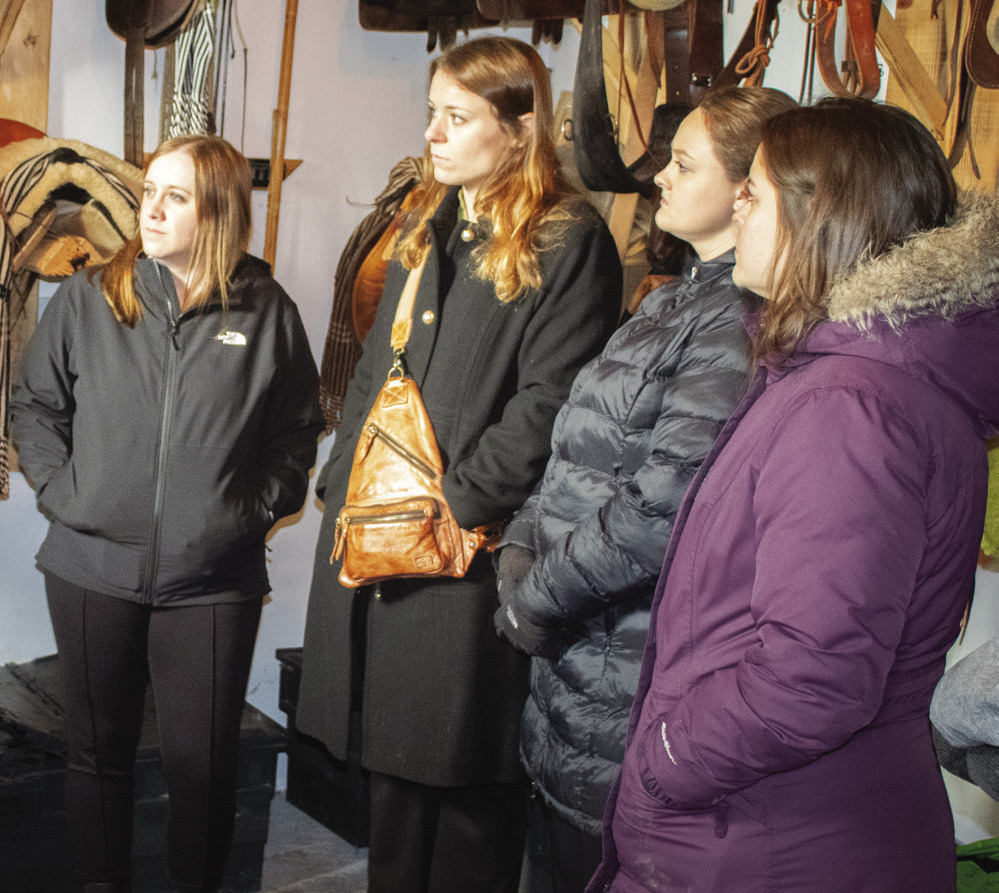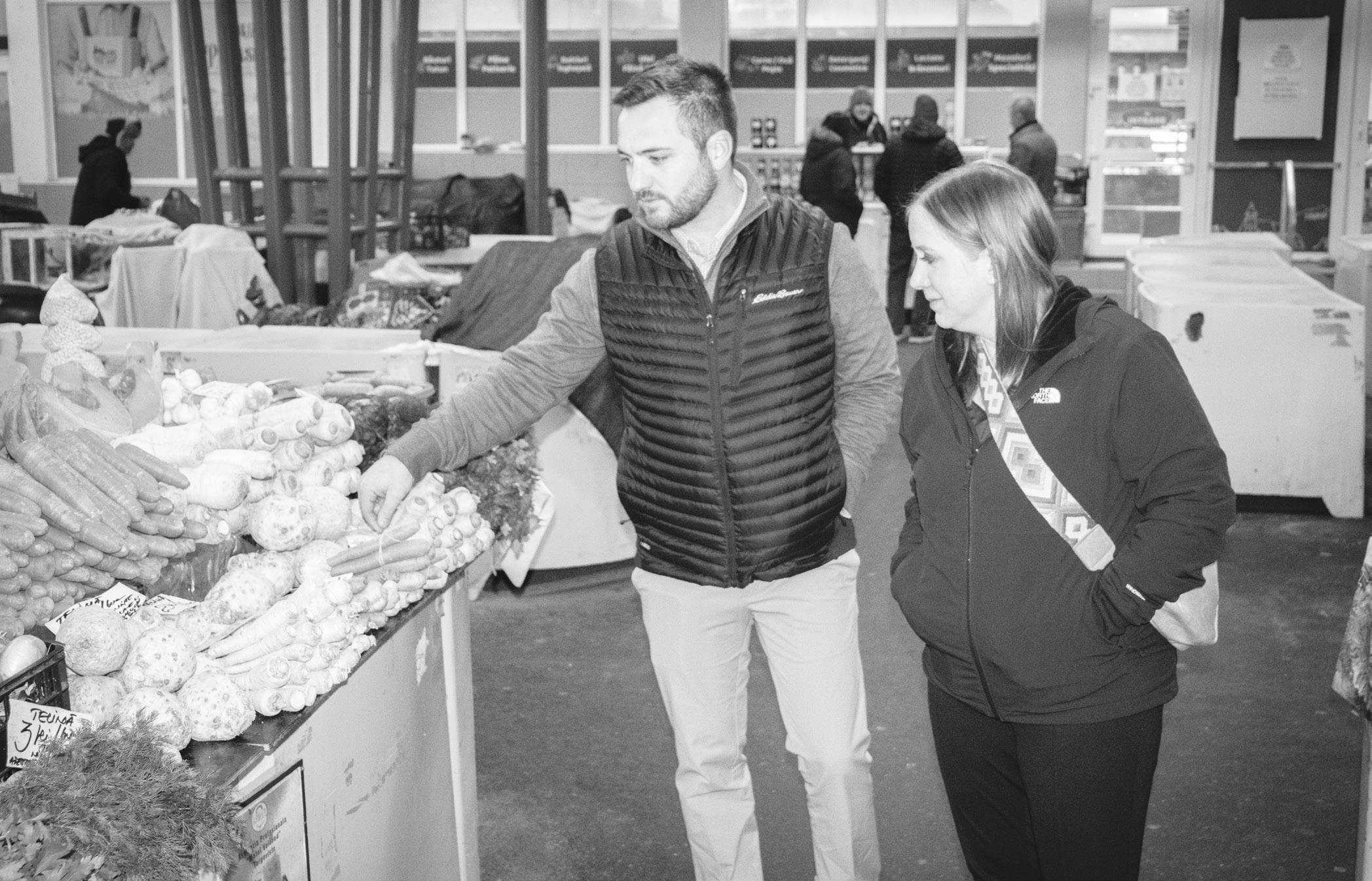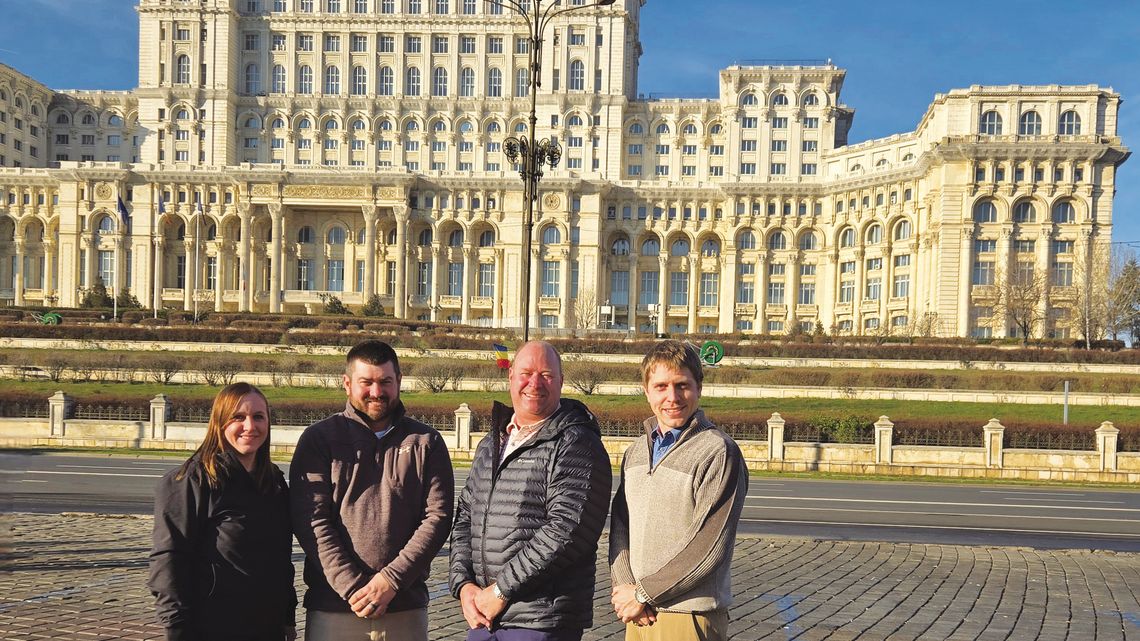“EVERYTHING IS TIED TO
Arcadia resident travels to eastern Europe with LEAD
Members of Class 42 of the Nebraska Agricultural Leadership Council’s Nebraska Leadership Education Action/ Development (LEAD) program recently returned from an international travel seminar. The a two-week journey took them through Poland, Hungary, and Romania, three North Atlantic Treaty Organization (NATO) member states along Ukraine’s western border. Among the future LEAD fellows was Michelle Bose, an Arcadia-area farmer and closing agent at Dvoracek Title in St. Paul.
Bose has lived and farmed in the Arcadia area with her husband, Tyler, for about the last ten years and been a closing agent at Dvoracek Title in St. Paul for about five. She’s a 2011 graduate of Elba Public Schools.
“I grew up between Elba and Farwell, and I went to Elba [Public Schools],” said the future LEAD fellow last week. “Arcadia’s where my husband’s from, and we were married ten years ago this year.”
Founded in 1981, the aim of LEAD is to “develop problem solvers, decision makers, and spokespersons for Nebraska agriculture and beyond” through a twoyear course entailing twelve monthly threeday seminars across Nebraska, a ten-day national seminar, and a fourteen–sixteen-day (including travel) international seminar.
“It’s a two-year ag-leadership program,” noted Bose. “It really focuses on critical thinking, teaching people how to think, not what to think…and how to become a better leader.”
In aiming to fulfill this mission, the future LEAD fellow noted, the program teaches its participants about “all aspects of Nebraska agriculture, and then how that ties in on a national and international level.”
Bose and her Class 42 peers began their course back in September 2023. They will graduate in late March this year. They had gone to Kansas City, Washington D.C., and Chicago, touring industries and talking to ag leaders as part of their national seminar last February. Their international seminar ran from the 3rd through the 17th of January this year.
In many ways, the international travel section of the trip functions as something like a capstone on each LEAD class’s study, helping them to put all that they have learned about domestic agriculture, Bose said, into a larger context.

OUTSIDE OF BRASOV, ROMANIA, Bose, left, and her fellow LEAD 42 members visit the stable tack room of a diversified farming operation that trains horses.
Over the course of about fourteen days last month, Bose and twenty- eight other future LEAD Fellows had spent five days in Romania, two days in Hungary, “about a day” passing north through Slovakia, then a remaining five days in Poland.
LEAD participants don’t know what country they will be going to until about a year into the program.
“You don’t find out where you are going until you start your second year [of LEAD],” noted Bose. “When we first found out where we were going, I was a little nervous, because all three countries share a border with Ukraine.
“We weren’t walking in blind; we knew what we were going to find when we got there,” she stressed. “We found out in September…and then our next three seminars focused a lot on the three countries we were going to, learning about the political climate and their ag background… They do a good job of preparing you ahead of time.”
Most of the trip, said Bose, had entailed meeting with ag leaders and touring local agribusinesses and farms, learning how the industry works in different countries with different landscapes and histories with agriculture.
“The farms were cool. We learned a lot at the farms,” she noted. “In Romania, we visited a guy who had been on the ministry of agriculture for the country at one point, and he was really good at talking to us about how he tries to support agriculture and the community, and about the [European Union (EU)] and their subsidies, and the different aspects of having a farm in the EU. Their rules and regulations are much different than what we have here.”
Something that stood out to Bose about agriculture in Poland, Romania, and Hungary is how much smaller, on average, the farms are.
“I think they said the average farm size in Romania is eleven hectares, which I think comes out to around twenty-five acres,” she noted, a result of the way the country transitioned back to private farm ownership after operating with a system of state-controlled collective farms as the Socialist Republic of Romania from 1947 until 1989.
In Poland, she said, farm size is limited by laws restricting the ownership of land by a single individual to 300 hectares, or about 740 acres.
“That’s all you can buy; you can’t grow bigger than that,” she noted. “You can inherit more.”
Beyond learning about the countries’ agricultural landscapes, the LEAD students had also spent much of their time on historical site tours, or simply learning about the histories and cultures of the places they were visiting.
In Romania, which had been the Socialist Republic of Romania for more than forty years, Bose had been surprised by how unceasingly the specter of communism haunted the present.
“They had the Romanian Revolution when they came out of communism in 1989, and we were there just shortly after the thirty-fifth anniversary of that,” she noted. “What really stood out to me is how much people still talk about [that time].
“There’s kind of a tug and pull between the different generations and how they feel about communism.”
Poland as well, she said, had been heavy with ghosts from the twentieth century, especially in Auschwitz- Birkenau.
“ Auschwitz, that was really impactful,” she said. “The day we were there, it was snowing, really cold, and it kind of informed the experience.
“We still really have no way of wrapping our heads around what went on there.”
Everywhere the group went, noted Bose, the war in nearby Ukraine had seemed ingrained into the fabric of life. None of the cities LEAD visited were “very close to the border,” but Bose and her class, she said, were able to experience some of the invasion’s impacts on the countries’ farmers and economic policies.
“All three countries talked about…how important it is to take care of their neighbors,” she said. “They’ve helped with moving the grain out of Ukraine and are exporting commodities out of their ports.”
The conflict had never felt closer, said the future LEAD fellow, than when they went to Poland.
“We actually felt very safe, up until the last day in Poland, when we visited an agritourism farm near Krakow,” Bose noted. “The owner was showing us around the property when he started telling us about the precautions they have put in place for when, not if, Russia invades Poland…It definitely caught us off guard, because nobody else had talked about it like that up until that point.
“The farm had also sheltered eighty-four Ukrainian women and children in the months after the war started.”
With the international seminar behind them, Bose and her classmates have a final meeting at the end of this month, in which they will “look at the health care industry in rural Nebraska,” before their graduation ceremony on March 21st.
Asked if she had any key takeaways from the trip, Bose said, “Everything is tied into agriculture.
“Sending us on an international seminar, I think, lets us to kind of put things in context. And you get to see how good we have it here.
“It made me think of how important it is to make sure we are electing people who are going to protect our way of life—and, if we can’t find somebody to do that, to step up and be doing it ourselves.”
In her work as a farmer and as a closing agent, Bose said she felt the experience of LEAD had been invaluable.
“It really feeds into both things,” she said. “It’s ag based, but a lot of the leadership stuff is applicable to anything.
“It all ties in together; one of the really great things about the LEAD program is that it binds the different aspects of agribusiness, ag production, and just everyday life together.”

BROWSING THE WARES at an indoor market in Brasov, Romania are Michelle Bose, right, and her fellow LEAD 42 classmate Blake Hokamp of Randolph. Courtesy Photo



